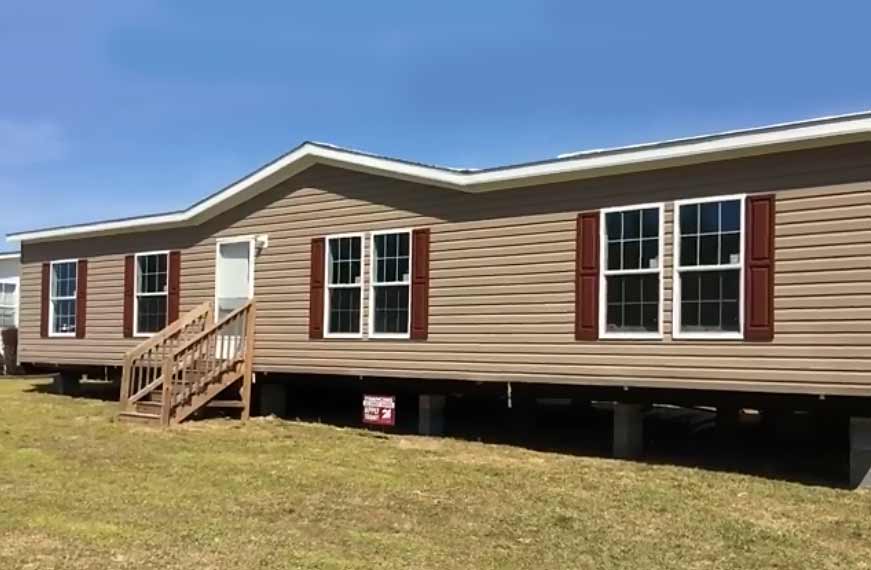Manufactured houses are fast becoming a popular housing type for prospective homeowners. As more people realize the lack of affordable housing in many housing types, they are turning to mobile home housing options. Over 22 million people have chosen manufactured homes as their preferred housing option. The biggest appeal of this type of home is its affordability, and its standards of quality in terms of material and construction process, which rivals that of traditionally built homes.
Aspiring mobile homeowners sometimes decide to buy land on which they install their mobile homes. One of the most vital decisions to make when buying land for a mobile home is the location of the land. There are important questions to ask before deciding on land for a mobile home; is the land suitable for mobile homes? Does the land have all it takes to make mobile home living comfortable?
Buying land for a mobile home with little thought or adequate consideration of the suitability of the land for you and your mobile home could have devastating consequences. In this article, we’ll discuss the factors to consider while buying land for mobile homes to ensure you get the best out of the land.
Zoning and Regulations
Many mobile home buyers have made the mistake of assuming that any available piece of land can be bought to install a manufactured home. This is not so. If you decide to buy a lot to place for your mobile home, you will need to ensure that the land you seek is available as mobile land for sale under zoning regulations. You may be prevented from placing your mobile home on land you bought if the piece of land is zoned for another use, for instance, commercial or industrial use.
Permits, Zoning Regulations, and Restrictions
Suppose the lot is considered mobile home land under zoning regulations. In that case, you are still required to acquire the necessary permits and adhere to other zoning laws and regulations of the area. Zoning regulations determine the location, size, shape, height, and setbacks of structures on land. Therefore, you must research state laws and local regulations before buying land for a mobile home.
Factors preventing you from situating your mobile home on land are not confined to laws and regulations alone. Private restrictions may prevent you from placing your home on affected land. They are legally binding limitations on land use, so it’s prudent to check if any affect your land.
Consult Local Authorities Or A Real Estate Professional
It is essential to know the zoning regulations applicable to the land as you may be subject to different requirements laws depending on location. To get this information, it’s advisable to consult relevant local authorities to obtain all pertinent information about the land you wish to purchase.
You could also contact a local manufactured home retailer for information about mobile home land for sale and all other necessary details. They are expected to be familiar with the rules and regulations governing permits, housing placement, and property location.
Accessibility And Location
You can buy land for a mobile home in a remote or secluded location, in a conventional neighborhood, or in a Manufactured Home Community (MHC). However, it is important to consider the accessibility to land whenever you select a land for your mobile home. Accessibility to land substantially affects your mobile home’s cost, delivery, and installation. For example, when a mobile home land for sale does not have a driveway, you will be required to construct one to facilitate delivery of your home. Local manufactured home retailers may offer land location services, presenting you with suitable mobile home land for sale.
Proximity to Amenities
When deciding on land to purchase, it is important to consider proximity to amenities such as schools, dining, shopping, entertainment, transportation, medical facilities, and emergency services. Every one of these amenities is important for you to live a comfortable life in your new home.
Evaluate Neighborhood’s Potential for Future Development
Buying land for mobile home in the right area could do wonders for your property value. Real estate appreciation has always been linked to location. For good returns on your investment, you would want to avoid buying land for a mobile home in a neighborhood that has not witnessed any growth over time. You can do market research or consult a local mobile home dealer or manufactured home retailer on the past development and potential for future growth.
Infrastructure and Utilities
When considering a mobile home land for sale, you need to know what utilities are available and which are not. Buying vacant lots in a MHC has an edge over other options in this regard. MHCs are specially created to place manufactured homes, and they make available all the utilities you might need.
Assess The Access to Utilities
Utilities are usually available when the listing of the mobile home land for sale says the land is improved. However, it’s best to err on the side of caution and do more research. Find out the availability of an electric pole with wiring that can be connected to your property.
Be sure to ascertain the presence of municipal water supply and sewer lines. It’s best to verify broadband availability and connection strength personally. Alternatively, if the land doesn’t have municipal pipes, you need to ensure you have good, drinkable well water and a septic system in good working condition.
Understand The Costs And Requirements For Connecting Utilities to The Home
Having utilities within your vicinity is good news. Now it’s time to consider the cost and requirements of connecting these existing utilities to the land. This is necessary to estimate the total worth of the land and the extra expense needed. You will want to figure out these costs before accepting an offer to ensure you are being offered a fair deal.
Topography And Land Characteristics
Site evaluation is the final step in determining land suitability for installing a mobile home. To prevent unforeseen circumstances from arising when installing your mobile home, it’s best to investigate the soil composition, elevation, drainage capacity, and other factors that may adversely impact your home installation or cause future problems.
Land Factors to Consider
Factors like land elevation, social compactness, and drainage capacity are essential in determining the stability of your mobile home foundation. It is prudent that you determine if the land is a flood zone area. Without site evaluation and investigation, you may run into many problems that would be costly or difficult to repair. It is best to consult with local authorities and field experts to ensure you get a risk-free land.
Assessing The Suitability of The Land for Installing Foundations, Driveways, And Landscaping
Manufactured homes are factory-built houses transported to a permanent location, and attached to a foundation. Like all other housing types, the foundation determines the house’s stability. To enjoy a long last home that fits your personal taste, your land terrain must be favorable for mobile home foundation installation, driveway construction, and landscaping.
Before buying land for a mobile home, you should consider all these factors and consult relevant authorities and trusted local manufactured home dealers to acquire relevant information. The manufactured home dealer is expected to know all the facts relating to home installation and may provide you with site preparation service after you have bought the mobile home land.




